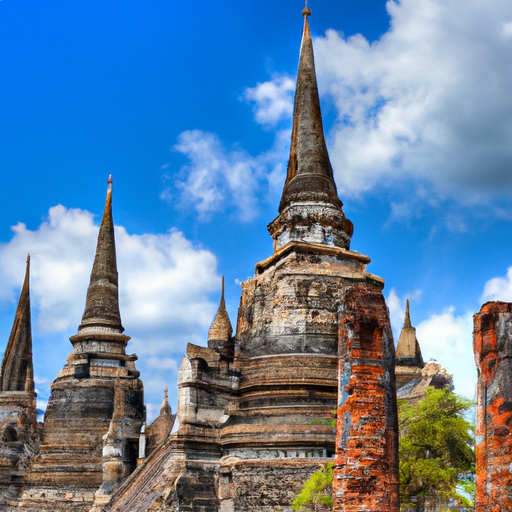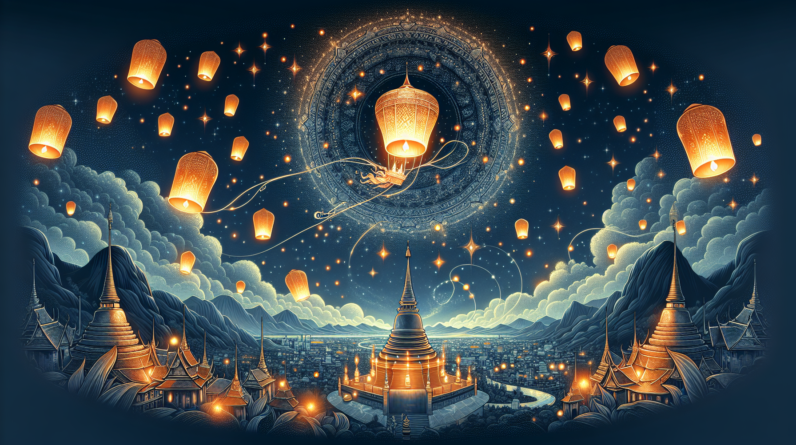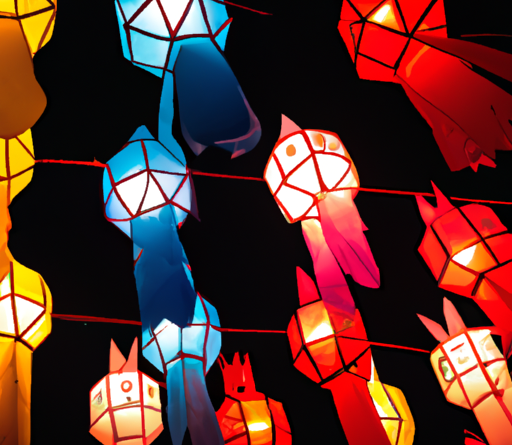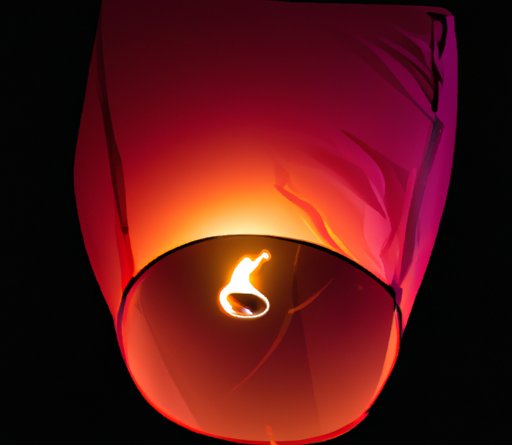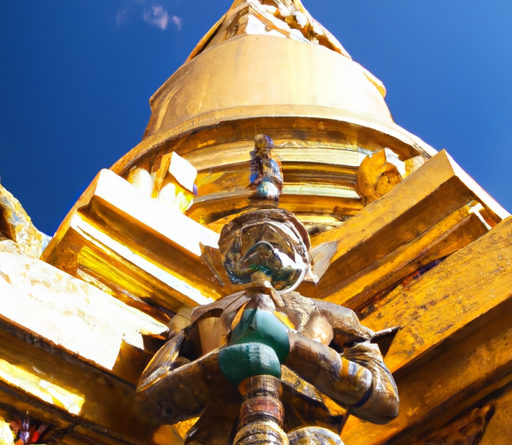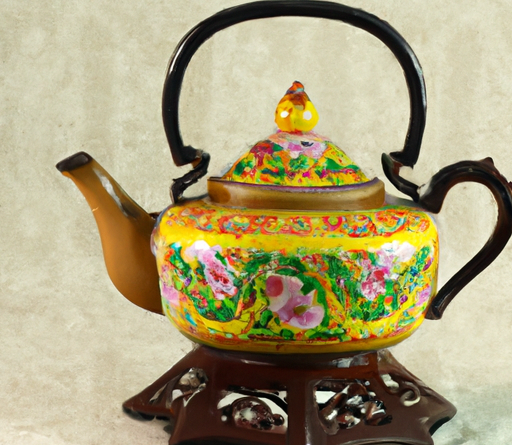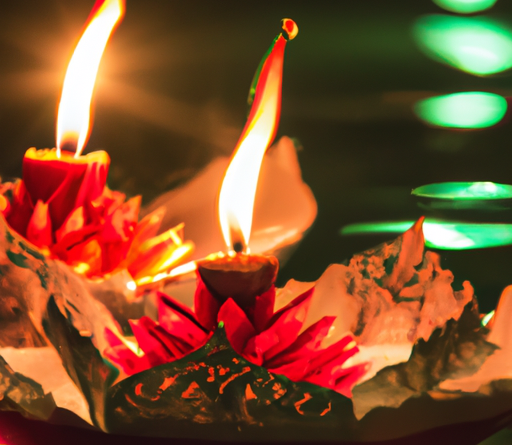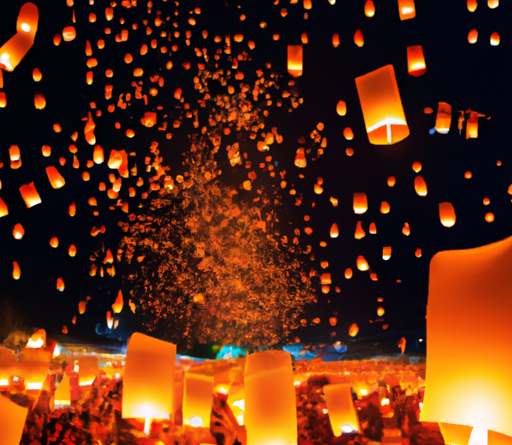
You have the opportunity to immerse yourself in the rich cultural heritage of Thailand by exploring its vibrant festivals. From the dazzle of the Loy Krathong lantern festival, where thousands of glowing lanterns float up into the night sky, to the exhilarating water fights of Songkran, an article is waiting to transport you to a world of colorful celebrations. Discover the history, traditions, and must-visit locations of these Thai festivals, ensuring you make the most of your visit to the Land of Smiles. Let’s embark on a journey to mastering Thai festivals with this comprehensive guide.
Overview of Thai Festivals
Introduction to Thai festivals
Thailand is known for its vibrant and captivating festivals that showcase the country’s rich cultural heritage. Thai festivals are a time of celebration, where locals and tourists come together to engage in traditional customs, pay homage to ancient traditions, and rejoice in the spirit of solidarity. These festivals are not only a feast for the senses but also provide a deep insight into Thai culture, religion, and customs.
Significance of Thai festivals in the culture
Thai festivals hold immense importance in the lives of the Thai people. They serve as a platform for preserving and promoting their cultural values, spiritual beliefs, and social cohesion. These festivals are often rooted in religious practices and symbolize auspicious events or mark significant milestones in Thai history. They foster a sense of community and provide an opportunity for family and friends to come together and strengthen their bonds.
Types of Thai festivals
Thai festivals can be categorize into various types, each with its distinctive themes and activities. Some of the most prominent festival categories include religious, harvest, and cultural festivals. Religious festivals like Songkran and Loi Krathong are deeply ingrained in Thai Buddhism and offer a chance for spiritual cleansing and renewal. Harvest festivals, such as the Boon Bang Fai Rocket Festival, celebrate the agricultural abundance of the region. Cultural festivals like Phi Ta Khon Ghost Festival showcase traditional folklore, while others like Yi Peng Lantern Festival add a touch of enchantment to the night skies.
Planning Your Visit
Best time to visit for festivals
To make the most of your visit, it’s crucial to plan your trip around the timing of Thai festivals. Some of the most popular festivals take place during specific months or have fixed dates on the Thai calendar. For instance, songkran festival, also known as the Thai New Year, falls on April 13th to 15th each year, while Loi Krathong Festival is typically celebrated in November. Researching the festival calendar beforehand ensures you don’t miss out on the festivities.
Researching and selecting the festivals to attend
Thailand boasts a plethora of festivals throughout the year, making it essential to research and select the ones that align with your interests and preferences. Look for festivals that resonate with your love for cultural immersion, photography, or adventure. Explore the significance, traditions, and locations of each festival to make an informed decision about which ones to prioritize. Weighing factors such as distance, logistics, and crowds can also help shape your festival itinerary.
Accommodation and transportation arrangements
When attending Thai festivals, it’s crucial to plan your accommodation and transportation arrangements well in advance. As festivals attract large crowds, accommodation options near the festival sites tend to fill up quickly. Consider booking your stay near the festival location to ensure convenient access and an immersive experience. Additionally, arrange for transportation to and from the festival grounds, as some festivals may involve traveling to non-urban areas or remote villages.
Budgeting for festival attendance
Attending Thai festivals can be a truly unforgettable experience, but it’s essential to budget accordingly. While some festivals are free to attend, others may require purchasing entrance tickets or participating in specific activities for an additional cost. Consider setting aside a separate budget for food, transportation, and souvenirs during the festival. Researching estimated costs and setting a realistic budget beforehand ensures a worry-free and enjoyable festival experience.
Important Cultural Etiquette
Understanding Thai cultural norms
To fully enjoy Thai festivals and show respect to the local culture, it’s crucial to understand and follow Thai cultural norms. Thais are known for their warmth, friendliness, and hospitality, so reciprocating these qualities is highly valued. Politeness, humility, and a smile go a long way in Thai culture. Learning a few basic phrases in Thai, such as greetings and expressions of gratitude, can also enhance your interactions with the locals and make them feel appreciated.
Appropriate attire and behavior during festivals
Thai festivals are an occasion to celebrate and pay homage to traditions, which often include visits to temples and sacred sites. It is important to dress respectfully and modestly during these events. Avoid wearing revealing clothing, shorts, or tank tops. Instead, opt for lightweight, breathable, and modest clothing that covers your shoulders and knees. Additionally, be mindful of your behavior and avoid any disrespectful actions, such as pointing your feet at religious statues or displaying public affection.
Respecting religious practices and customs
Many Thai festivals have religious undertones and are deeply intertwined with Buddhism. It’s important to respect the religious practices and customs during these festivals. Be aware of any rules or restrictions in temples, such as removing shoes before entering or refraining from photography in certain areas. It is also customary to perform a wai (a Thai greeting) when approaching monks or receiving blessings. Taking the time to understand and appreciate Thai religious traditions shows respect and enhances your festival experience.
Interacting with locals
Thai festivals provide an excellent opportunity to interact with the locals and forge meaningful connections. Thais are known for their friendly and welcoming nature, so don’t hesitate to strike up conversations and engage with them. Respect local customs, such as removing your shoes before entering someone’s home, and be mindful of cultural sensitivities. Asking for permission before taking photographs of individuals or sacred sites is considered polite. Showing genuine curiosity and appreciation for Thai traditions will make your interactions more enjoyable and enriching.
Major Thai Festivals
Songkran Festival
Songkran Festival is one of Thailand’s most famous festivals and marks the Thai New Year. Celebrated from April 13th to 15th, the festival is renowned for its vibrant water fights and symbolic cleansing rituals. Locals and tourists come together to splash water on each other, bringing relief from the scorching heat and symbolizing the washing away of the past year’s misfortunes. The festival also involves visiting temples, making merit, and paying respect to elders. Some of the best locations to celebrate Songkran include Chiang Mai, Bangkok, and Phuket.
Loi Krathong Festival
Loi Krathong Festival, also known as the Festival of Lights, is a visual spectacle celebrated on the full moon night of the twelfth lunar month (typically in November). During this festival, people release beautifully decorated krathongs, which are small floating vessels made of banana leaves and flowers, onto rivers and waterways. These offerings symbolize letting go of negativity and making wishes for the future. In addition to the krathong floating ritual, Loi Krathong also includes beauty contests, cultural performances, and breathtaking firework displays. Chiang Mai, Sukhothai, and Ayutthaya are popular destinations to experience the beauty and charm of this festival.
Yi Peng Lantern Festival
Yi Peng Lantern Festival is an enchanting event that takes place in Chiang Mai during the full moon of the twelfth lunar month (usually coinciding with Loi Krathong). Thousands of lanterns, known as khom loi, are released into the night sky, creating a mesmerizing spectacle. The lanterns are thought to carry away misfortune and bring good luck and prosperity. Chiang Mai’s old city and surrounding temples provide a picturesque backdrop for this ethereal celebration. During the festival, visitors can participate in lantern-making workshops, offer prayers at temples, and experience the magic of releasing their own lanterns into the sky.
Phi Ta Khon Ghost Festival
Phi Ta Khon Ghost Festival, also known as the Ghost Mask Festival, is a lively and colorful event held in the Dan Sai district of Loei province. This festival is a unique blend of ancient animistic beliefs and Buddhist traditions. Locals dress up as ghosts, wearing elaborate masks and vibrant costumes, to reenact the legend of Prince Vessantara. The festival features traditional parades, vibrant dances, and mock ghost weddings. Visitors can join in the festivities, try on ghost masks, and immerse themselves in the rich cultural heritage of the region.
Boon Bang Fai Rocket Festival
Boon Bang Fai Rocket Festival, also known as the Rocket Festival, is an exciting and explosive event celebrated in northeastern Thailand. This festival marks the beginning of the rainy season and aims to encourage the gods to send rain for a fruitful harvest. Colorfully decorated rockets, some as tall as ten meters, are launched into the sky in a competition to see whose rocket can reach the greatest height. The festival also includes traditional dance performances, vibrant parades, and lively music. Visitors can take part in rocket-building contests, watch the procession, and feel the thrill as rockets soar through the sky.
Songkran Festival
Background and history
Songkran Festival, also known as the Thai New Year, is deeply rooted in both Buddhism and ancient Thai traditions. The word “Songkran” originates from Sanskrit and refers to the astrological passage of the sun from one sign of the zodiac to another. The festival celebrates the end of the dry season and the beginning of the Thai New Year. Traditionally, Songkran involved the pouring of blessed water over Buddha statues and the hands of elders as a sign of respect and purification. Over time, it has evolved into the world-renowned water fight festival that attracts millions of visitors each year.
Traditions and activities
The main highlight of the Songkran Festival is the playful water fights that take place across the country. It is a time when people of all ages take to the streets armed with water guns, buckets, and hoses, dousing each other in refreshing water. The water fights symbolize the cleansing of the past year’s misfortunes and the welcoming of a new beginning. In addition to water fights, Songkran also involves visiting temples to make merit and pay respect to ancestors. People pour scented water over the hands of monks as a way of seeking blessings and washing away bad luck.
Best locations to celebrate
While Songkran is celebrated throughout Thailand, some locations are particularly famous for their grand festivities. Chiang Mai, in northern Thailand, is renowned for its elaborate parades, cultural performances, and massive street water fights. Bangkok also boasts a lively celebration, with popular areas such as Khao San Road turning into a water-soaked playground. Pattaya, Phuket, and Ayutthaya are other popular destinations to experience the vibrant energy and water-filled fun of the Songkran Festival.
Tips for participating in water fights
Participating in Songkran water fights can be an exhilarating experience, but it’s important to keep a few tips in mind for a safe and enjoyable time. Firstly, make sure to protect your electronic devices and valuables by storing them in waterproof bags or leaving them in a secure place. Remember to wear appropriate clothing and apply sunscreen to protect your skin from the scorching sun. Be respectful of others’ personal boundaries and ask for consent before drenching someone with water. Additionally, keep water fights limited to designated areas and avoid splashing water on monks, the elderly, or people who do not wish to participate.
Safety precautions
While Songkran is a joyful and festive occasion, it’s essential to stay vigilant about safety to avoid accidents. Drink responsibly and moderate your alcohol consumption, as excessive drinking can lead to accidents and impaired judgment. Be aware of your surroundings and exercise caution when walking near busy roads or crowded areas. Avoid throwing water at moving vehicles or motorcyclists, as this may cause accidents. Furthermore, wear appropriate footwear that provides good traction to prevent slipping on wet surfaces. By keeping these safety precautions in mind, you can ensure a fun-filled and safe Songkran experience.
